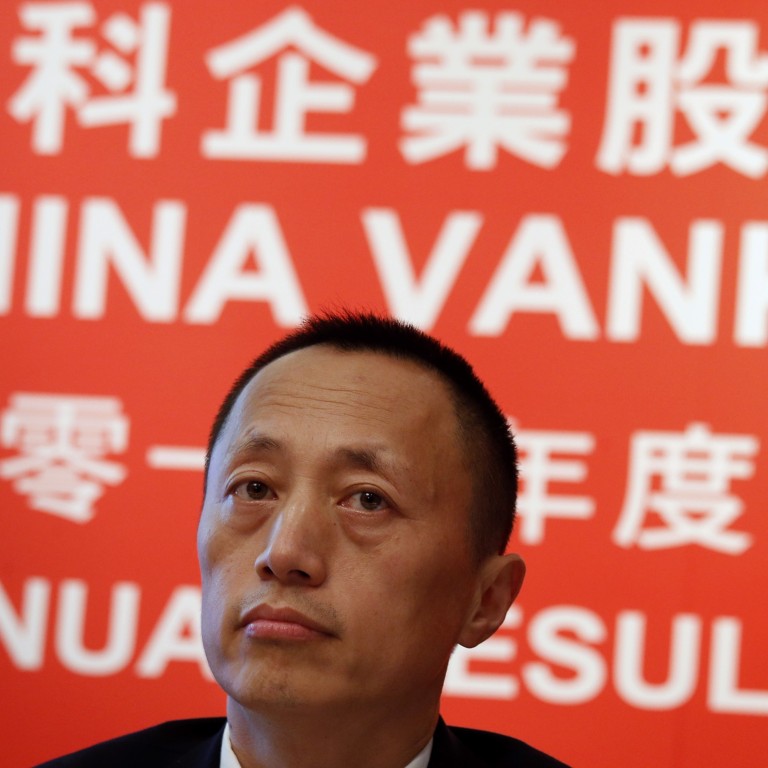
Vanke builds loyalty with partnership scheme
Mainland developer offers its executives an alternative to leaving and starting over again, by having their own venture with the company
China Vanke, the mainland's largest developer by sales, has introduced a two-layered employee partnership scheme that is bringing multiple benefits to the group.
At the project level, frontline managers are required to make compulsory personal investments in the company, while ordinary employees have the option of deciding for themselves. Their combined equity stake is capped at 10 per cent of any Vanke project company.
At the corporate level, an investment vehicle pooling the profit-sharing bonuses of 1,320 employees over the past three years has been buying Vanke's shares in the secondary market, pushing up the price of the stock. There is no limit to the size of the stake it can buy.
With this scheme, the company could retain experienced workers, fend off attempts at a hostile takeover and smooth the path to conversion of its Shenzhen-listed foreign currency-denominated B shares to H shares to be listed in Hong Kong later this month, analysts said.
"It is a long-term incentive for talent to stay in the industry," said David Hong, a senior analyst with mainland property services company E-House (China). "Peers may follow if the feedback is positive."
Like its rivals, Vanke is suffering from the correction in the mainland's once sizzling real estate industry that has thrown into doubt near-term prospects for developers as their profit margins decline.
A recent academic survey showed the mainland had 49 million empty homes in urban areas last year, far more than the estimated demand for 32.5 million new homes from first-time buyers and upgraders.
As the industry leader, Vanke offers relatively high salary packages. Chairman Wang Shi, chief executive Yu Liang and eight executive vice-presidents were among the industry's 50 best-paid executives last year. Tan Huajie was the industry's highest paid board secretary.
Nonetheless, some experienced managers have left in the past few years to start their own ventures or moved to other companies.
Vanke wanted to offer its executives a better alternative to leaving and starting from scratch, by having their own venture in partnership with the company, Yu said last month.
By that time, Vanke had tested the partnership scheme on 13 projects across the country and had seen positive changes.
Yu said top local managers had become more dedicated, changing their work schedules to visit clients and working partners during the day and returning to the office in the evening for internal meetings.
Meanwhile, different departments have started to help one another instead of kicking problems around, and local teams have an incentive to cut costs, sometimes by renting a farmhouse as a temporary office while working on a project.
However, Bei Fu, a senior property analyst from global rating agency Standard & Poor's, said Vanke had to be careful not to rely too much on the personal judgment of individuals, even though they put their own money into the projects.
"If certain individuals become very ambitious, it can also be detrimental," she said. "If not executed well, it can also become a challenge to the company."
For Yu, possible changes to the industry caused by technology advances loom much larger than the still unfolding industry downturn.
"In the internet age, the pyramid organisational structure will become outdated sooner or later. A flattened structure is the future, and partnership is the best arrangement," he said.
The company further embraced the internet this month by teaming up with mainland search engine leader Baidu to use location-based technology in its projects so that Vanke could better analyse the activities of its clients and improve its services to them.
In the internet age, the pyramid organisational structure will become outdated
Vanke's partnership programme drew the attention of market observers late last month when its internal fund began buying the group's shares on the mainland's secondary market.
It bought a 1.34 per cent stake for 1.2 billion yuan (HK$1.5 billion) in a week. The first purchase was made on May 28, at 8.38 yuan per share; a year earlier, the stock traded at 12.36 yuan per share.
In a recent report, Citi property analyst Oscar Choi set a target price for Vanke of 15.20 yuan this year, based on a 10 per cent discount to estimated net asset value of 16.89 yuan per share.
The decline in the price of Vanke's stock has put the firm at risk of an unfriendly takeover. Its top shareholder, China Resources, owns a 15 per cent stake after buying an additional 0.24 per cent on the secondary market on March 20 as a symbolic warning to hostile bidders.
China Resources, the parent of Hong Kong-listed China Resources Land, was regarded as a friendly shareholder, analysts said.
Two insurers have been fighting for control of Gemdale, another listed mainland developer, raising fears in the industry that cash-rich companies could take advantage of the slide in property stocks.
Some still remember the incident in 1994 when Junan Securities led some Vanke shareholders to force a re-election of its board and the restructuring of its business.
As current senior management and employees buy up Vanke shares, they will acquire more control of the company.
The purchase of stock by Vanke's employees is also seen as a demonstration of the company's confidence about its outlook, giving retail investors holding its B shares more reason to keep their stake during the transfer to H shares, scheduled for later this month.
Meanwhile, trading has been halted in Vanke's B shares. They last traded on June 3 at HK$12.41.

